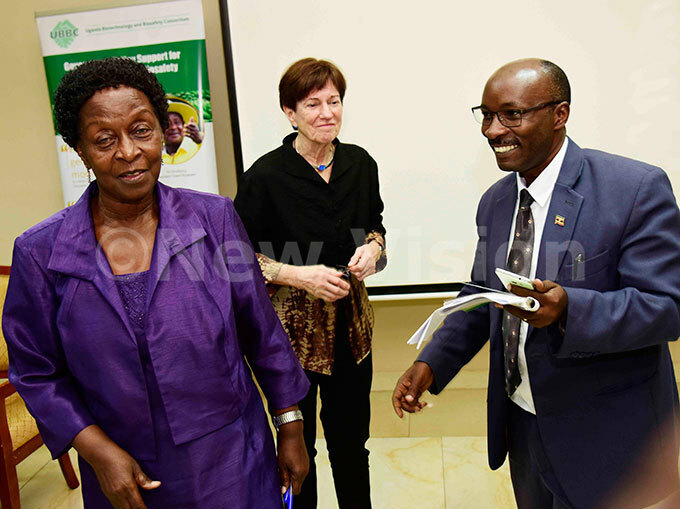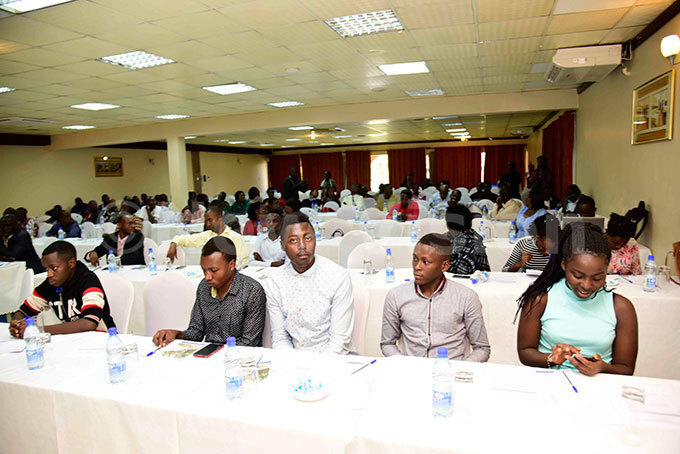GMOs are safe, says US biotech expert
A 2014 Pew poll showed that 88% of scientists in the US and only 37% of ordinary people believed GMOs were safe.
SCIENCE AND TECHNOLOGY
KAMPALA- The use of modern scientific methods of food production is the best chance for countries like Uganda to increase yields and incomes for farmers in an uncertain future, a renowned US scientist has advised.
Dr. Nina Fedoroff, a molecular biologist from Pennsylvania State University in the United States says safe biotech innovations were available to solve challenges posed by climate change.
On Tuesday, Fedoroff backed the use of Genetically Modified Organisms (GMOs) to increase food production, saying existing research indicates that they are safe for humans and animals.
 Makerere University official Tereza Sengoba (left) talks to Arthur Tugume while Pennsyvania State University's (centre) Nina Fedoroff looks on, during Public Lecture on harnessing modern biosciences for improved healthcare, food security and economic transformation, at Hotel Africana in Kampala.
Makerere University official Tereza Sengoba (left) talks to Arthur Tugume while Pennsyvania State University's (centre) Nina Fedoroff looks on, during Public Lecture on harnessing modern biosciences for improved healthcare, food security and economic transformation, at Hotel Africana in Kampala.
She, however, acknowledged that skepticism about the safety of GMOs has persisted since 1980s due to vicious campaigns by organisations and individuals without facts to back claims.
"Recent data from 1,783 credible studies shows zero evidence that people or animals have been harmed by GMOs. All the stories about GMO links to cancer have been a result of fear-mongering," she stated.
Fedoroff was speaking at a public lecture held in Kampala under the theme: "Harnessing Modern Biosciences for Improved Healthcare, Food Security, and Economic Transformation."
She acknowledged that even among scientists in the US, opinion about GMOs was mixed. A 2014 Pew poll showed that 88% of scientists in the US and only 37% of ordinary people believed GMOs were safe.
Fedoroff said the rapid spread of ‘fake science' was inhibiting the potential for useful application of biosciences to solve pressing challenges affecting food security, farmer incomes, nutrition and health.
She praised the role of technology in increasing food production citing the Green Revolution that was able to increase food production fivefold in countries including Mexico, India and Pakistan between 1950 and 2004.
This was mainly in rice. The Green Revolution involved the adoption of improved seed, mechanisation, fertilizers and irrigation among other technologies advanced by Norman Borlaug.
Fedoroff is a decorated scientist who was in 2007 awarded the National Medal of Science by then President, George W. Bush.
Fedoroff is a member of the United States National Academy of Sciences, the American Academy of Arts and Sciences, the European Academy of Sciences, and the American Academy of Microbiology.
Gene modification involves the transfer of genes from one organism to another. Uganda has not embraced GMOs for commercial use but research is underway at the level of confined field trials.

Genetic modification is just one of several forms of breeding. The technology has drawn mixed global reaction, with adherents touting its value in producing crops that are resistant to pests and diseases.
However, some critics of the innovation claim that it violates moral and ethical scientific practices, leading to extinction of indigenous species and leaving farmers at the mercy of multinational seed firms.
Last year, Parliament passed the National Biosafety Act 2017, which was meant to provide a legal and regulatory framework for the safe development and application of biotechnology.
However, President Yoweri Museveni declined to sign the bill into law citing several shortcomings, particularly on aspects of conservation of indigenous species and small scale farmer's rights to seed.
Uganda is a signatory to the Cartagena Protocol which mandates parties to ensure an adequate level of protection in the transfer, handling and use of living modified organisms resulting from biotechnology.
Over the years, Uganda has conducted successful trials on plant varieties including bananas said to be resistant to banana bacterial wilt, cassava against cassava brown streak, maize and cotton.
With the populations rising, the size of arable land shrinking and yields per acre declining, some experts are convinced faster maturing varieties that are resistant to drought, pests and diseases are the answer.
Experts at Tuesday's public lecture renewed their call for the enactment of a law to regulate the research, application and commercial use of biotechnology.
The lecture was organized by the U.S. Mission Uganda and the Ministry of Science, Technology and Innovation and the International Food Policy Research Institute to share evidence on regulation and use of biosciences in food
Agnes Ameede, the Butebo district Woman MP said Ugandan researchers have not done enough to help farmers to deal with challenges.
"Where were the researchers when farmers were gambling with pesticides as they tried to get rid of the fall army worm which was ravaging gardens countrywide?" Ameede asked.
She also suggested that much of the research on biotechnology innovations was funded by development partners, making the researchers beholden to interests of the funders.
However, Deborah Wendiro, a scientist at the Uganda Industrial Research Institute insisted that the source of funding was not a problem since the research was for solutions to domestic challenges.
"We are aware that a significant part of the national budget which comes to government, including Parliament, is from development partners. We also get a Parliamentary grant for research," she stated.
She said the most urgent requirement was the enactment of a law to regulate research and application of biotechnology, which offers promise to deal with some of the current and future threats.
"Without a biotech law, Uganda will be like a dustbin where we consume anything that comes to us. There are products in supermarkets today with traces of GMOs but nobody is talking," Wendiro said.